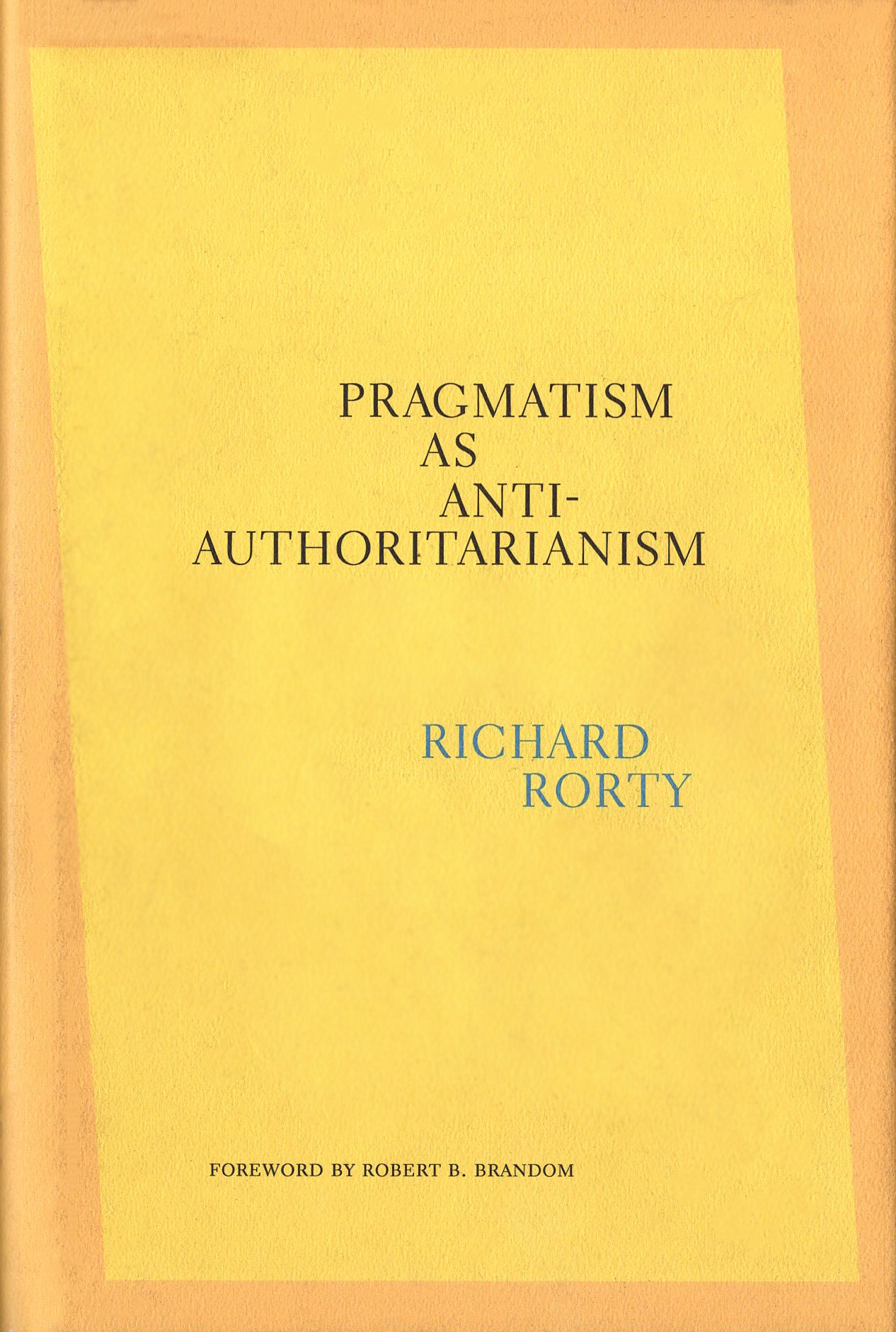REVIEW: Richard Rorty, "Pragmatism as Anti-Authoritarianism"
Cover, Pragmatism as Anti-Authoritarianism by Richard Rorty. Image Courtesy Harvard University Press.
REVIEW
Pragmatism as Anti-Authoritarianism
by Richard Rorty
Edited by Eduardo Mendieta
Foreward by Robert Brandom
Hard cover (27.95); Paperback, ($19.95)
Harvard University Press
By Michael Workman
A little setup to get us going. The opening paragraphs of the interview with Richard Rorty in Volume 2, number 2 of the Bridge Journal by Sam Fleischacker are:
“Philosophers used to be heavily in the business of arguing for or against religious faith of various kinds. Most of us have stopped doing that, but in a time where the return to a very traditional and non-rational Christianity, Islam and Judaism has become such a prominent, and dangerous, feature of the world’s political landscape, isn’t this a job to do which we should return? On your views, though, it would be difficult to do that, no?
“It was in great part to prove or disprove the existence of God, miracles, an afterlife, etc. that much of the heavy machinery of the metaphysical and epistomological systems you oppose was developed. It is hard to imagine launching a useful argument on these questions using merely the tools of science, literature, or its political rhetoric. So if you agree with me that it is imperative to return to that issue—and maybe you don’t—how would you think we should go about doing it?”
Note the emphasis on politics, if you will. To which Rorty replied:
“I don’t agree that science and literature are insufficient for the purpose of warning people against the dangers of ecclestiastical institutions, and of hoping that pie in the sky will make up for deprivations here and below. I cannot see that what you call the ‘heavy machinery of metaphysical and epistemological systems’ was very useful for that purpose. Influential atheistical tracts like Shelley’s and Paine’s did not rely on such systems. Those systems merely gratified the wish of intellectuals to have something like a surrogate for religion. But the proper surrogate for religion is commitment to political change—change leading to a greater social justice and greater human freedom. Providing that surrogate is a matter of debating possible political initiatives, and metaphysics and epistemology do not have much of a role to play in encouraging people to join such initiatives.”
This new collection of Rorty’s lectures, timely as Fleischacker’s original question may track to us now, equally transcends the question of politics, while posing what may be considered some conclusive assessments as to the role of Pragmatism as a stance intrinsically opposite that of the impulse to authoritarianism.
The only philosophy thus far produced by the American experiment, its roots, or course, reach back to the Metaphysical Club at Harvard, where it was cooked it up by Charles Peirce and William James, and lived on to extend its influence through a long notable list of practitioners to John Dewey, the first Chair in the first years of the University of Chicago’s Philosophy Department from 1894-1904, who became in many ways seen as the culminating figure of its thought — until Rorty.
Pragmatism as Anti-Authoritarianism is the sum of a series of lectures Rorty gave over time, some published in Philosophical Papers and delivered, in part, in his role of Ferrater Mora Chair of Contemporary Thought as a series of lectures of the same name at the University of Girona between June 25 and June 29, 1996. Originally titled by Rorty “Anti-Authoritarianism in Epistemology and Ethics,” these collected lectures were “first published in Catalan in 1998 and in Spanish in 2000,” though they were not published “together in English, the language in which they were written, until now.”
The volume is introduced with an excellent establishing foreward by Robert Brandom. In it, aptly titled “Achieving the Enlightenment,” Brandom lays out the case for the inheritances of the Enlightenment as a turn against the “scala natura, the Great Chain of Being” that, in its later Christianized form, gave us the divine right of kings and the hierarchies that came to define how the “ultimate source of our responsibilities and obligations lies outside of us, in something non-human, in the way things anyways are, apart from and independently of our practical activities and attitudes.”
These resonances continue in the stark reflection of our fractious societal “heavy machinery” across the movements of history through to our present day. In it persist a reflection of the failures of the Enlightenment ideals that drove the world-altering American and French revolutions, and the shortcomings of those sociocultural transformations. In their intentional blind spots, leaving out as they did those same types of “unalienable human rights” for women and people of color, these Enlightenment motivations have simultaneously long fairly been held up as proof of the corruption of their implicit incrementalist stances while also establishing the notion that “everyone who is bound by a law should have a say in imposing that law: the ideal of universal suffrage, in the sense of according all those bound by (responsible to) laws the authority to make them.”
The demonstrative fallibility of these principles, and of the conclusions to self-governance they established, managed to elide any critique of their own insufficient telos, out of which flows our near-universal ideals and notions of individual autonomy and Democratic order, with all its rooted attendant responsibilities and obligations. Brandom sees Rorty arguing that pragmatism “should be understood as defined by its commitment to bringing about a second Enlightenment beyond the practical sphere, applying it to the theoretical sphere. It is to be applied not only to ethics and politics, but to epistemology.” He continues:
“At the center of the version of pragmatism Rorty announces in this book is the thought that just as we should be anti-authoritarian in ethics in rejecting the authority of God over the correctness of what we do, we should be anti-authoritarian in epistemology by rejecting the authority of objective reality over the correctness of what we believe. Construed as the non-human locus of this sort of authority, Reality no more exists than God does.
“This is a radical idea. It is one thing to emancipate ourselves from practical domination by the patriarchal dictates of what William Blake called “Old Nobodaddy.” That is in a certain sense something we can do by coming to suitably redescribe and reconceive ourselves. For what we are freeing ourselves from is a snare powered by a delusion.”
Therein lies the basis of these collected lectures and essays that echoes back to Rorty’s earliest (and arguably most widely recognized) efforts set forth in Philosophy and the Mirror of Nature, with its articulations of the representationalist mind, in its Spinoza-like project to eliminate the self-evidentiary “flaws of our errors and the gaps of our ignorance.” Damning though this may seem to be in grasping after any current efficacious frame of reference, it only strengthens the notion of individual autonomy and Democratic order of a reified humanist, pragmatist, anti-authoritarian project, that now may be perceived through the lens of “a semantic understanding of representation in normative terms.” That is to say, a completion of the Enlightenment project in all its humanistic determinations, excised of the shortcomings and ignorances, the self-refutations of eliminative materialism and offering as it does such provisos to legitimations of authority that may otherwise result in tyranny. In that sense, as Rorty notes in his preface, he starts from the premise of the project of pragmatism “as an attempt to let a sense of democratic citizenship take the place of a sense of obligation to a non-human power.”
In much of what follows, whether in his critique of Habermas, or in the spectrum of relative positions from Rawls to Dennett, Rorty seeks out ways to further articulate these assessments as a kind of philosophical jurisprudence on the subjects of epistemological thought, pointing out the shortcomings and lack of force in claims of universal validity, assessing how “communities have betrayed their own interests by being too sure of themselves.” I would add here the widespread similar dead-end shortcomings of pop or otherwise mass cultural embraces of strategic essentialism, especially as applied in exclusionist claims about LGBTQ, Black or POC communities out to sell special interests.
Eventually, almost inevitably, this leads to a sifting through the rubble of empiricism and deep dives into methods of truth and justification, of course, which ultimately reflect back on the William James’ principle that a difference has to make a difference to practice before it is worth discussing. Wherefore thou, justified true belief? Well, it persists in coherentist approaches worth recalling (here he cites Apel, Habermas again, and Putnam of course,"), and skewers the sloganeering of unconditionality: “from a pragmatist point of view, the notion of ‘unalienable human rights ‘ is no better or worse a slogan than that of ‘obedience to the will of God.’”
“Either slogan, when invoked as an unmoved mover, is simply a way of saying that our spade is turned—that we have exhausted our argumentative resources. Talk of the will of God or of the rights of man, like talk of “the honor fo the family” or of “the fatherland in danger” are not suitable targets of philosophical analysis and criticism. It is fruitless to look behind them. None of these notions should be analyzed for they are all ways of saying “Here I stand: I can do no other.” They are not reasons for action so much as announcements that one has thought the issue through and come to a decision.”
This sort of rigidity is intentional, and intended to exclude, to extract from the discourse any sorts of skepticism necessary to the kind of continuing inquiry fruitful for democratic order. “If you favor democratic politics,” Rorty writes in his chapter on “Universality and Truth,” “you will want to encourage fallibilism, but there are other ways to do so besides harping on the difference between the conditional character of justification and the unconditional character of truth.”
In that sense, this is not only a crucially important capstone volume to Rorty’s lifelong pragmatist project, but one that serves as a kind of guidebook for how to accomplish its most desired, most beneficial outcomes for a world we may wish to not only imagine, but to actually bring about. “I think that, once one has explicated the distinction between justification and truth by that between present and future justifiability, there is little more to be said,” Rorty reminds us, and thinks that, to the contrary, “… there is a lot more to be said, and that saying it is important for democratic politics.” It remains in the doing of it then, that the emergence of our own sense of anti-authoritarianism can be founded to foster that necessary sea change that this volume, and the spirit of our shared experiment, aspires to.
Michael Workman is Editor-in-chief of Bridge.
Like what you’re reading? Consider donating a few dollars to our writer’s fund and help us keep publishing every Monday.



